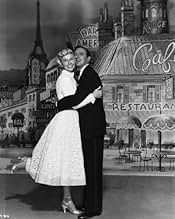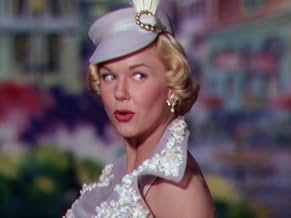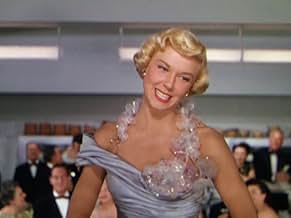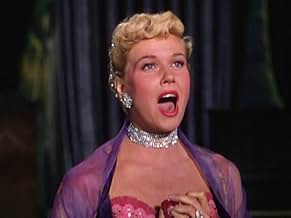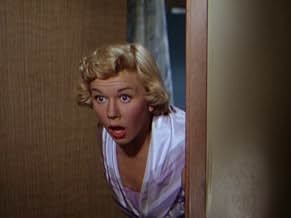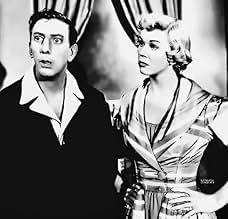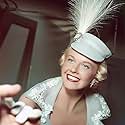NOTE IMDb
5,9/10
1,6 k
MA NOTE
Ajouter une intrigue dans votre langueA series of misunderstandings leads to a chorus girl traveling to Paris to represent the American theater, where she falls in love with a befuddled bureaucrat.A series of misunderstandings leads to a chorus girl traveling to Paris to represent the American theater, where she falls in love with a befuddled bureaucrat.A series of misunderstandings leads to a chorus girl traveling to Paris to represent the American theater, where she falls in love with a befuddled bureaucrat.
- Réalisation
- Scénario
- Casting principal
Aladdin
- Violinist - 'Rock the Boat Tonight' number
- (non crédité)
Leon Alton
- Stagehand
- (non crédité)
Betty Arlen
- Young Woman
- (non crédité)
Frank Baker
- Delegate
- (non crédité)
Doris Barton
- Chorus Girl
- (non crédité)
Mary Bayless
- Ship Passenger
- (non crédité)
Mary Benoit
- Secretary
- (non crédité)
Avis à la une
Easily the worst film Doris Day ever made. She plays a brassy show girl from New York who is mistakenly invited to represent the USA at a cultural shindig in Paris. The stuff-shirt dope who made the error is played by Ray Bolger (nearly 20 years Day's senior). Neither Day nor Bolger manage to stay in character.
Title song aside, all the other songs stink. Claude Daupin occupies a dumb subplot about a Frenchman trying to get home without any money to pay for a passage on the ocean liner ... even though he's a famous impresario. Paul Harvey plays the senior US official and Eve Miller (she's terrible) plays his daughter who's supposedly engaged to Bolger.
Day and Bolger did not get along during production and it shows. Even under the best of circumstances, it's unlikely there would have been any chemistry between them. Bolger had a reputation for upstaging his fellow performers and acting like a prima donna. Having said that, it's amazing how many off-key notes he hits in his opening song-and-dance number. Painful.
Bolger had made a hit on Broadway with 1948's "Where's Charley?" and he starred in the film version the same year he made this film with Day. It was his last starring role in a film.
The cheesy sets and lackluster supporting cast add to the misery. Director David Butler, who had been an actor in silent films, directed Day in several other films with much better results. Bolger seems to be the fly in the ointment.
Title song aside, all the other songs stink. Claude Daupin occupies a dumb subplot about a Frenchman trying to get home without any money to pay for a passage on the ocean liner ... even though he's a famous impresario. Paul Harvey plays the senior US official and Eve Miller (she's terrible) plays his daughter who's supposedly engaged to Bolger.
Day and Bolger did not get along during production and it shows. Even under the best of circumstances, it's unlikely there would have been any chemistry between them. Bolger had a reputation for upstaging his fellow performers and acting like a prima donna. Having said that, it's amazing how many off-key notes he hits in his opening song-and-dance number. Painful.
Bolger had made a hit on Broadway with 1948's "Where's Charley?" and he starred in the film version the same year he made this film with Day. It was his last starring role in a film.
The cheesy sets and lackluster supporting cast add to the misery. Director David Butler, who had been an actor in silent films, directed Day in several other films with much better results. Bolger seems to be the fly in the ointment.
Before seeing April in Paris I saw a fair few bad things written about it, about Ray Bolger being miscast, the story being disposable and the songs being weak. As someone who liked Doris Day, I went ahead and watched it anyhow. The criticisms are understandable actually, but April in Paris is not as bad as it has been made out to be and is hardly a film without redeeming qualities. Ray Bolger is not really the ideal lead role for Day, he was a likable comic actor when his skills were used well but he is too old here and is more supporting comic role actor than leading man. He and Day don't have very much chemistry either, or one that is completely natural. The story is toilet-paper-thin and contrived- true that not many musicals of that particular time had particularly great stories, but there are not many that are as redundant as the story here- and while there are nice snappy moments the wit and satire in the script isn't sharp enough. April in Paris doesn't look too bad though, one does wish that real Parisian locations and more Parisian fashions were seen and some of the sets are on the garish side but the photography is still attractive and Day's dresses are lovely. The songs are definitely not weak either, "I'm Gonna Ring the Bell Tonight", "April in Paris" and "That's What Makes Paris Par-ee" are simply beautiful songs and while not quite as great the other songs work. While Bolger is not leading man material and his strengths are not really used, his dancing is very light-as-a-feather and he looks very comfortable doing it. Charles Dauphin is charming too, while the choreography and dance routines are at least well-staged and put you in a good mood. Day is the best thing about the film, her singing is just enchantingly beautiful, she's completely at ease and she lights up the screen in everything she does from smiling, dancing, singing and acting. Overall, not a great film but while the criticisms are valid it is better than given credit for and Day is fabulous. 6/10 Bethany Cox
This picture was made when Doris Day was "Doris Day", that fresh-faced, delightful blond singer who lit up the screen with her beautiful smile and glorious singing.
"April in Paris", directed by David Butler was a colorful, joyous romp for Doris Day and Ray Bolger. Mr. Bolger has been criticized for not being a suitable co-star for Miss Day, but I felt he did a credible job in the picture. No, he was not handsome, like Rock Hudson, but Rock couldn't DANCE like Bolger!
And dance up a storm, he does! I enjoyed his acrobatic dance routines in "I'm Gonna Ring the Bell Tonight" and the political-themed dance with former Presidents' portraits, coming to life to dance with Bolger.
Doris Day, as Ethel "Dynamite" Jackson, a chorus girl, who is mistakenly chosen, instead of Ethel Barrymore, to represent America at a Paris Festival, is energetic and bouncy and mostly delightful. Her rendition of "April in Paris" was hauntingly beautiful and the highlight of the film.
The nicely staged, "It Must Be Him" also showcased Miss Day's glorious voice and dancing skills as did "That's What Makes Paris Paree".
Claude Dauphin lugubriously reprises the title tune in a side-walk cafe with the wind blowing bitterly while he sings the song to Doris Day.
To my knowledge, this is the only occasion in which Doris Day has a fist fight on the screen! If you can believe it, she was battling over Ray Bolger with Eve Miller, who also had the illusion that Bolger was "Clark Gable".
In the aforementioned, "I'm Gonna Ring the Bell Tonight", Doris Day opens the number with some rousing singing and later joins Bolger for some fancy footwork.
If you love Doris Day, you'll like this picture. As usual, there was able support by veteran actors like Paul Harvey, who later played "Henry Miller", proprietor of the Golden Garter in "Calamity Jane".
"April in Paris", directed by David Butler was a colorful, joyous romp for Doris Day and Ray Bolger. Mr. Bolger has been criticized for not being a suitable co-star for Miss Day, but I felt he did a credible job in the picture. No, he was not handsome, like Rock Hudson, but Rock couldn't DANCE like Bolger!
And dance up a storm, he does! I enjoyed his acrobatic dance routines in "I'm Gonna Ring the Bell Tonight" and the political-themed dance with former Presidents' portraits, coming to life to dance with Bolger.
Doris Day, as Ethel "Dynamite" Jackson, a chorus girl, who is mistakenly chosen, instead of Ethel Barrymore, to represent America at a Paris Festival, is energetic and bouncy and mostly delightful. Her rendition of "April in Paris" was hauntingly beautiful and the highlight of the film.
The nicely staged, "It Must Be Him" also showcased Miss Day's glorious voice and dancing skills as did "That's What Makes Paris Paree".
Claude Dauphin lugubriously reprises the title tune in a side-walk cafe with the wind blowing bitterly while he sings the song to Doris Day.
To my knowledge, this is the only occasion in which Doris Day has a fist fight on the screen! If you can believe it, she was battling over Ray Bolger with Eve Miller, who also had the illusion that Bolger was "Clark Gable".
In the aforementioned, "I'm Gonna Ring the Bell Tonight", Doris Day opens the number with some rousing singing and later joins Bolger for some fancy footwork.
If you love Doris Day, you'll like this picture. As usual, there was able support by veteran actors like Paul Harvey, who later played "Henry Miller", proprietor of the Golden Garter in "Calamity Jane".
Of all the major Hollywood studios, Warner Brothers were always the most cheese-paring. All of their musicals -- except the wonderful 'Yankee Doodle Dandy' and some later adaptations of Broadway musicals -- are marred by extremely low budgets and obvious economy measures. 'April in Paris' is one of several Warners musicals featuring an established popular ditty (with a stiff price-tag for performance rights) as the movie's title song, buttressed by some very forgettable songs by resident Warners tunesmiths. Except for one high-spirited and high-kicking number called 'Ring the Bell Tonight', only the E.Y. Harburg/Vernon Duke title song is memorable here.
Doris Day amazes me, not only for her unearthly beauty and her quiet sex appeal, and for her underrated acting ability, but also for her musical talents. I've read that Day originally trained as a dancer, but switched to a career as a vocalist after she was injured in a car accident. Her singing voice is so clear and beautiful, I've difficulty believing that singing was her second choice of career. And, as she proves here, she has no physical handicap as a dancer ... unless you count the dull choreography of LeRoy Prinz.
Ray Bolger is an interesting choice of romantic leads for Day, but the two of them don't really team very well. Here, he plays a character very similar to the one played by Donald O'Connor in 'Are You with It?': a repressed wonk who turns out to be a superb dancer. Bolger (an underrated actor) is quite good in his straight scenes here as a harried bureaucrat, a less nelly version of Edward Everett Horton ... but that character just doesn't match up with Bolger's dazzling dance numbers. Bolger's Massachusetts accent is much more obvious here than in any of his other films. Bolger was sometimes required to play epicene men, as in the Broadway musical 'By Jupiter'. Here, he's impressively virile, as he strips off his dinner jacket and lights into some rapid-fire nerve taps far more proficient than Ann Miller's.
I always enjoy watching Bolger dance. Here, regrettably -- blame it on LeRoy Prinz -- Bolger doesn't do anything he hasn't done better in several better musicals, except for a brief trick shot in which he dances between two full-length portraits of Washington and Lincoln (also played by Bolger) who dance along with him. I was impressed with a brief pas de deux between Bolger and Day, in which she dances conventionally but manages to keep up with Bolger while he does his usual "Where's Charley?" moves.
The contrived plot line requires Bolger and Day to mistakenly believe they're married to each other. Two Frenchmen perform the wedding service without actually being qualified for that job. This being a Hollywood film of the 1950s, it's imperative that the fake marriage remain unconsummated, so the two Frenchmen then have conscience pangs and sabotage the marital bed so that no sex can take place ... instead of simply admitting their deception. Speaking of 1950s morals: this movie's dialogue features several occurrences of the word 'gay' in its innocent sense.
Two of my least favourite movie clichés are: every building in Washington DC is directly across the street from the Capitol, and every location in Paris has a clear view of the Eiffel Tower. We get both of those clichés in this movie. On the positive side, we get a brief appearance by character actor Shepard Menken as a Parisian waiter. Actress Eve Miller does her best in an unplayable role as Day's rival. Eve Miller's acting career never quite caught on; she suicided shortly after her fiftieth birthday.
The movie's weird plot gives us Claude Dauphin as an omniscient Frenchman. A gag sequence requires that Ray Bolger's hat be several sizes too large ... but later the same chapeau fits him perfectly, and later still it's too large again when the scriptwriter recycles the gag. This movie is more than competently directed by the underrated David Butler, but matters are not helped by a script which requires Day's and Bolger's characters to be unable to make up their minds about deeply important issues such as love and career. Still, as enjoyable froth, I'll rate 'April in Paris' 7 out of 10.
Doris Day amazes me, not only for her unearthly beauty and her quiet sex appeal, and for her underrated acting ability, but also for her musical talents. I've read that Day originally trained as a dancer, but switched to a career as a vocalist after she was injured in a car accident. Her singing voice is so clear and beautiful, I've difficulty believing that singing was her second choice of career. And, as she proves here, she has no physical handicap as a dancer ... unless you count the dull choreography of LeRoy Prinz.
Ray Bolger is an interesting choice of romantic leads for Day, but the two of them don't really team very well. Here, he plays a character very similar to the one played by Donald O'Connor in 'Are You with It?': a repressed wonk who turns out to be a superb dancer. Bolger (an underrated actor) is quite good in his straight scenes here as a harried bureaucrat, a less nelly version of Edward Everett Horton ... but that character just doesn't match up with Bolger's dazzling dance numbers. Bolger's Massachusetts accent is much more obvious here than in any of his other films. Bolger was sometimes required to play epicene men, as in the Broadway musical 'By Jupiter'. Here, he's impressively virile, as he strips off his dinner jacket and lights into some rapid-fire nerve taps far more proficient than Ann Miller's.
I always enjoy watching Bolger dance. Here, regrettably -- blame it on LeRoy Prinz -- Bolger doesn't do anything he hasn't done better in several better musicals, except for a brief trick shot in which he dances between two full-length portraits of Washington and Lincoln (also played by Bolger) who dance along with him. I was impressed with a brief pas de deux between Bolger and Day, in which she dances conventionally but manages to keep up with Bolger while he does his usual "Where's Charley?" moves.
The contrived plot line requires Bolger and Day to mistakenly believe they're married to each other. Two Frenchmen perform the wedding service without actually being qualified for that job. This being a Hollywood film of the 1950s, it's imperative that the fake marriage remain unconsummated, so the two Frenchmen then have conscience pangs and sabotage the marital bed so that no sex can take place ... instead of simply admitting their deception. Speaking of 1950s morals: this movie's dialogue features several occurrences of the word 'gay' in its innocent sense.
Two of my least favourite movie clichés are: every building in Washington DC is directly across the street from the Capitol, and every location in Paris has a clear view of the Eiffel Tower. We get both of those clichés in this movie. On the positive side, we get a brief appearance by character actor Shepard Menken as a Parisian waiter. Actress Eve Miller does her best in an unplayable role as Day's rival. Eve Miller's acting career never quite caught on; she suicided shortly after her fiftieth birthday.
The movie's weird plot gives us Claude Dauphin as an omniscient Frenchman. A gag sequence requires that Ray Bolger's hat be several sizes too large ... but later the same chapeau fits him perfectly, and later still it's too large again when the scriptwriter recycles the gag. This movie is more than competently directed by the underrated David Butler, but matters are not helped by a script which requires Day's and Bolger's characters to be unable to make up their minds about deeply important issues such as love and career. Still, as enjoyable froth, I'll rate 'April in Paris' 7 out of 10.
True, even for the breezy 1950s, the plot for this musical is as light as a feather--but if you are a DORIS DAY fan, as I certainly was during these early Day films at Warner Bros., you'll be enchanted by her way with a song--particularly "I'm Gonna Ring the Bell Tonight", "April in Paris" and "That's What Makes Paris Par-ee". And on top of that, she excels in all of her dance routines, even those in which RAY BOLGER clearly has the spotlight to himself.
It's one of those mistaken identity plots that Warners used extensively throughout the '40s and '50s, something about a showgirl being mistaken for a diplomat and mistakenly invited to represent the U.S. at a French festival. Naturally, all is straightened out in time for a happy ending although I can't say I detected any real chemistry between Bolger and Day--even in a musical where logic doesn't really matter.
The dances staged by LeRoy Prinz are not the best, but there are some cheerful, well staged moments when Bolger gets to do his tap routines and limber legged dancing. All in all, it passes the time pleasantly if you have a weakness for musicals the way they were in the '50s. And Doris proves that singing wasn't her only asset. Her dancing is also very professional (and not surprisingly, she intended to become a dancer before an accident ruined her plans and she switched to singing).
It's one of those mistaken identity plots that Warners used extensively throughout the '40s and '50s, something about a showgirl being mistaken for a diplomat and mistakenly invited to represent the U.S. at a French festival. Naturally, all is straightened out in time for a happy ending although I can't say I detected any real chemistry between Bolger and Day--even in a musical where logic doesn't really matter.
The dances staged by LeRoy Prinz are not the best, but there are some cheerful, well staged moments when Bolger gets to do his tap routines and limber legged dancing. All in all, it passes the time pleasantly if you have a weakness for musicals the way they were in the '50s. And Doris proves that singing wasn't her only asset. Her dancing is also very professional (and not surprisingly, she intended to become a dancer before an accident ruined her plans and she switched to singing).
Le saviez-vous
- AnecdotesDoris Day wrote in her autobiography that she only encountered trouble or tension on two of her Warner Bros. movies: 'April in Paris' and Un amour pas comme les autres (1954). Regarding this film, she claimed that leading man Ray Bolger and director David Butler clashed early on, with Butler accusing Bolger of trying to steal scenes away from Day. She also mentioned that being a relative newcomer to movies, she was unaware of Bolger's tricks and managed to stay out of the line of fire.
- GaffesRay Bolger supposedly flies to New York when he realizes the invitation mixup, but the plane is shown flying over the Wrigley Building in Chicago.
- Citations
Ethel S. 'Dynamite' Jackson: It's no use, Philippe. I'm in love with the man I married. And he's not even my husband!
Philippe Fouquet: Even in Paris, that's an unusual situation.
- ConnexionsFeatured in IMDb Originals: Doris Day: In Memoriam (2019)
Meilleurs choix
Connectez-vous pour évaluer et suivre la liste de favoris afin de recevoir des recommandations personnalisées
- How long is April in Paris?Alimenté par Alexa
Détails
- Date de sortie
- Pays d’origine
- Langues
- Aussi connu sous le nom de
- París en Abril
- Lieux de tournage
- Société de production
- Voir plus de crédits d'entreprise sur IMDbPro
- Durée
- 1h 40min(100 min)
- Rapport de forme
- 1.37 : 1
Contribuer à cette page
Suggérer une modification ou ajouter du contenu manquant


